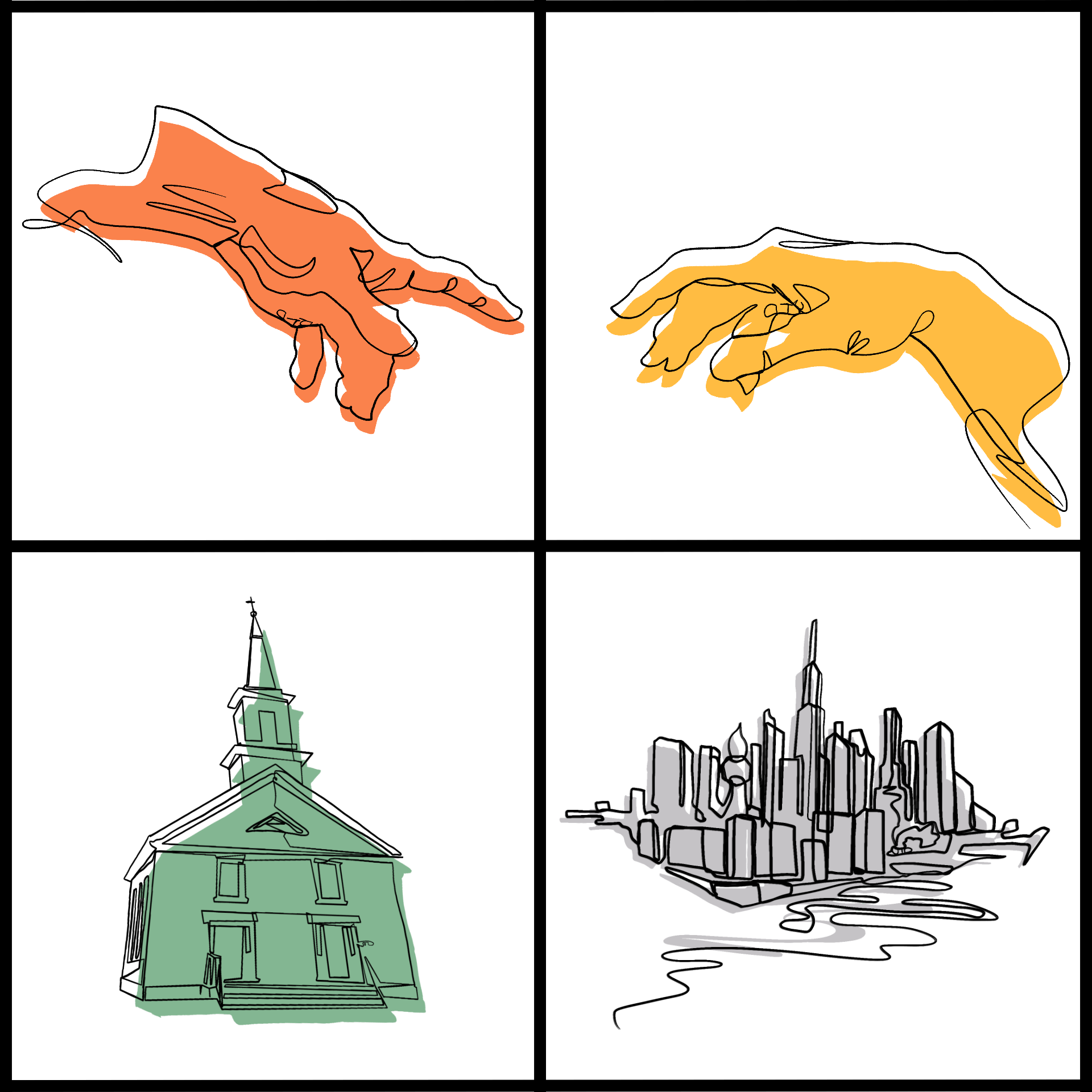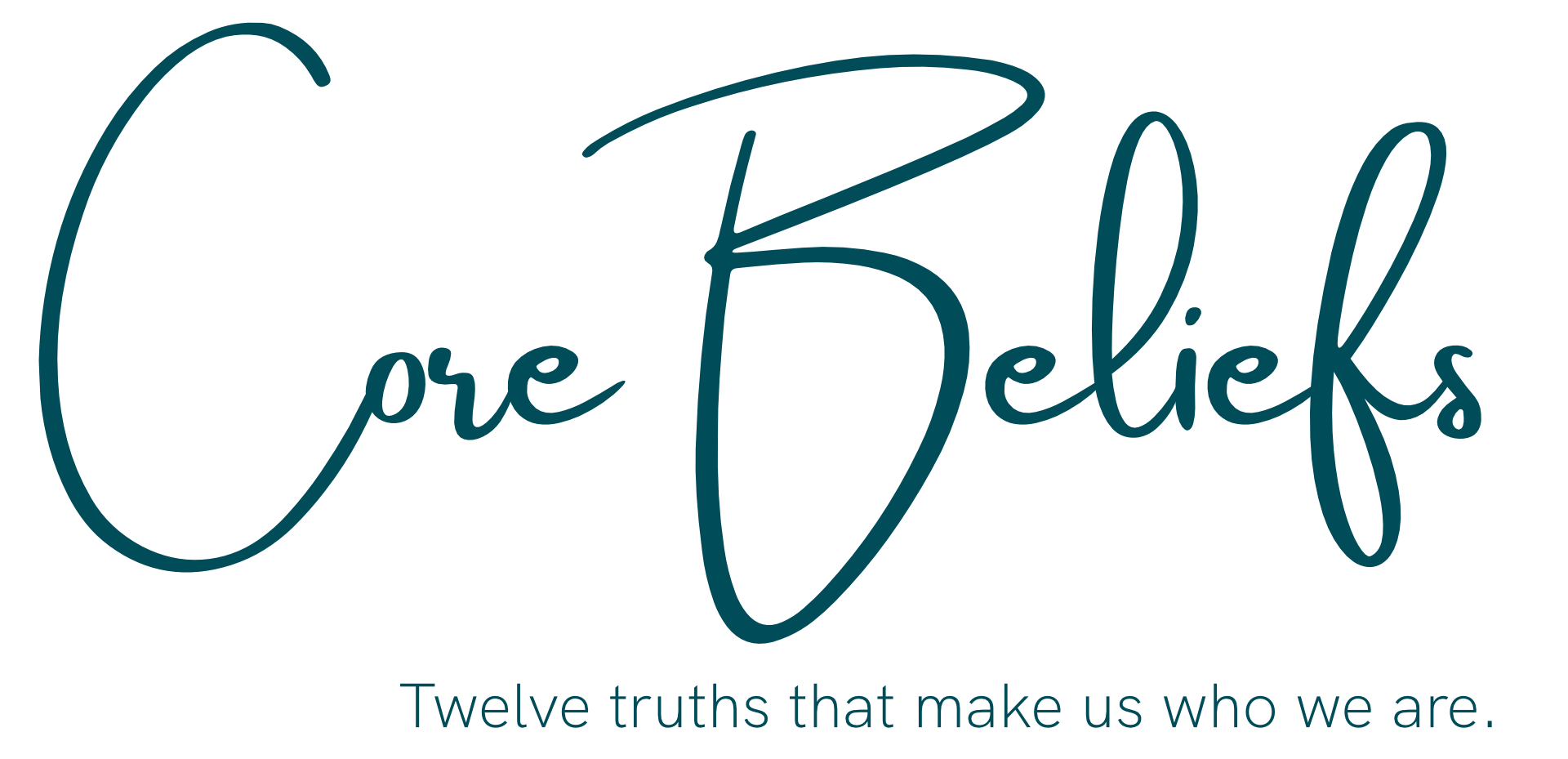1: God is a Good Father
What do we mean by this?
The Trinity
As we dive into this examination of our core beliefs, we begin with God Himself. Scripture describes Him as a Trinity. He is one God, but three persons: God the Father, God the Son, and God the Holy Spirit. We will have something to say about each member of the Trinity, and we begin, of course, with the Father.
What is God Like?
The vast majority of people throughout history have believed that God was real. But who is God in relation to us? Some say He’s a force who doesn’t interact with us at all, but hovers somewhere over the universe. Others say He’s is personal, but unfeeling. Still others think He micro-manages the world and is perpetually angry.
We could spend years studying the many views of God that are out there, but our journey is a specific one. It doesn’t matter so much how any one person or group thinks about Him. What does our Master say about Him? How did Jesus talk about God?
Metaphors of God in the Old Testament
The writers of the Old Testament described our relationship with God using many types of metaphors. For example, He is our Shepherd (Psalm 23), our Strong Tower (Psalm 61:3), the Rock of Israel (2 Samuel 23:3), the Light to the Nations (Isaiah 42:6), and our Wonderful Counselor (Isaiah 9:2).
These metaphorical titles all point to very real roles God plays in our lives. They suggest how He relates to us. As our shepherd, He tends to our needs. As our strong tower, He protects us. As our rock, He remains faithful and unchanging. He illuminates our path like a light, and He whispers freedom like a counselor.
Of all the beautiful metaphors in the scriptures, Jesus focused primarily on one. When He taught His followers to pray, He did not tell them to say, “Our Shepherd,” or “Our Wonderful Counselor.” No, the metaphor He used was “Father.”
“Our Father who art in heaven, hallowed be Thy name.”
Our Father
Father. This was Jesus’ favorite way to talk about the first Person of the Trinity. In fact, there are more than 150 instances in the four Gospels where Jesus refers to God as “Father.” That is by far more than any other title.
What does the metaphor mean? It means God gives life like a father. He protects like a father. He provides like a father. He loves His children.
Unfortunately, not everyone loves this metaphor. Many of us have had terrible experiences with our fathers, and it makes us nervous to hear the word associated with the maker of heaven and earth.
Fortunately, Jesus makes it clear: God isn’t just a Father. He’s a GOOD Father.
“Or what man is there among you who, when his son asks for a loaf, will give him a stone? Or if he asks for a fish, he will not give him a snake, will he? If you then, being evil, know how to give good gifts to your children, how much more will your Father who is in heaven give what is good to those who ask Him!” (Mt 7:9-11)
Indeed, this is the message of the story of the prodigal son. This God sits on His porch and waits for His children, no matter their crimes. He welcomes us back home, no matter how long we’ve been gone. He will not take us back as servants. No, that’s not enough. He wants us back in His home where we belong.
This week, we’ll meditate on some verses that talk about our Father’s irrepressible goodness.
Watch the Sermon by Pastor Joshua
Listen to the sermon
2: Jesus Christ is both Savior and King
What do we mean by this?
“In the Beginning was the Word, and the Word was with God, and the Word was God” (Jn 1:1). With these words, John tells us that Jesus Christ (the Word) was with Father even before the creation of the world, and that He was one with the Father.
In the New Testament, Jesus came close, and we got a clear glimpse of Him. He didn’t come down in a cloud of mystery, but in a body made of muscle and skin, bone and fat. He was born to a poor Jewish woman in a forgotten corner of an empire where Caesar was Lord. Little did the emperor know, he was about to be displaced.
Jesus as Lord
When the angel announced Jesus’ birth, He called him “Christ, the Lord.” In other words, Christ, the King. Christ, the Caesar. Christ, the Mighty Emperor of the Heavenly Kingdom. And this subversive message was not “good news” for the Jews only, but “for all people.”
All throughout Jesus’ ministry, He drew attention to that truth. He talked openly about “The Kingdom of Heaven,” and He was upfront about Himself as the King of that Kingdom. All throughout the New Testament—well over 200 times, in fact—Jesus is referred to as “Lord,” which literally means “master” or “sovereign ruler.”
This title was not only a challenge to the political rulers of the day, it is also a challenge for us, too. Why? Because we don’t live in a nation ruled by a king, and we aren’t used to being told what to do. The whole idea that someone else ought to have leadership over us feels downright offensive! And yet, this is precisely what the New Testament demands of us: that we acknowledge the kingship of Jesus, and we live as faithful and obedient subjects in His Kingdom.
Jesus as Savior
He is more than King, of course. He is also the One who saves. Once again we see hints of this even in the announcement of Jesus’ birth: “You shall call His name Jesus,” the angel said. “For He will save His people from their sins” (Matt 1:21). And He did.
How did He do it? By dying in our place. His sacrifice and resurrection rescued us from sin, death, and the devil. He was the lamb of Judah, who laid down His life for us so that we could live with Him forever.
Though Jesus calls us into relationship with Him, His salvation is not strictly “personal.” He doesn’t just save us from something ugly. Rather, He saves us into something beautiful: the Kingdom of God. When we put our faith in Christ for salvation, we gain entrance to His kingdom, of which there is no end.
That means that all of us who have called Jesus our Savior must also call Him our King. In other words, obedience to Christ is not an optional upsell for believers. Instead, it is the only proper response to a mighty King who has saved us.
Why this is a Core Value to Us
It’s easy to focus entirely on obedience to our Lord while ignoring His salvation, or to focus on His grace and forget His Lordship. If we do, we set ourselves up for either legalism or a false idea of freedom. We don’t get to pick and choose which parts of God to believe in. We must accept the whole truth of who He is.
At Christ’s Center, we believe we must keep both truths before our eyes: Jesus saved us from sin and death; therefore, He gets to rule us. Our life is His, and our obedience is a grateful response, not a heavy weight. “His yoke is easy, and His burden is light.” He’s the most wise and loving being in existence. We can trust Him, not only with our sin, but with our lives. And when we do this together, in community, our character begins to look like His. We become more gracious, more humble, more patient and more kind. In short, we begin to look more like Jesus.
Watch the Sermon by Pastor Jason
Listen to the Sermon
3: The Holy Spirit is Active
What do we mean by this?
The Holy Spirit is sometimes referred to as “the Third Person in the Trinity.” Maybe that’s because Jesus lists Him third when He said to baptize disciples, “In the name of the Father, the Son, and the Holy Spirit.” Or maybe it’s because the Holy Spirit is mysterious, and talk of Him can make us uncomfortable.
But make no mistake about it: the Holy Spirit is not “God-lite.” He is just as Divine as the Father or Jesus Himself. Indeed, He is the Spirit of God on earth, and He is interacting with us all the time.
What does the Holy Spirit Do?
Since the Holy Spirit is God’s presence on earth, He does MANY things. For example,
He is our Helper (John 14:26)
He is our Comforter (John 14:26)
He leads us into truth (John 16:13)
He convicts us of sin (John 16:7-8)
He fills us with boldness (Acts 4:29-31)
He gives good gifts to edify us and help us minister to others, sometimes in supernatural ways (I Cor 12:7-11)
Those “gifts of the Spirit” have been the source of much dispute. Some Christians believe the gifts of the Holy Spirit have ceased altogether (an idea called cessationism), but we respectfully disagree. Frankly, we have seen too much. Both in our personal lives and in the life of our church, God has shown up. We have seen Him answer prayers and watched Him heal diseases. We have received His prophetic guidance and have felt His perfect peace. These are the works of the Holy Spirit. He hasn’t stopped working. He is actively involved in our lives. And we want to be open to ALL of His activity.
Why is this a Core Belief?
In the book of Zechariah, an angel came to a man named Zerubbabel, who was rebuilding the temple of the Lord. It was an extremely difficult task, but the angel assured him of this: “Not by might, nor by power, but by my Spirit, says the LORD of hosts” (Zech 4:6) We think the same is true for each of us. It is by the Spirit of God, not by our own strength, that we are able to live victoriously in this life. Without His activity, we are utterly powerless..
But when we invite Him into our lives—when we live with His presence—we can accomplish everything He’s called us to do. He has commanded us to love our enemies, to bind up the broken, and to rebuild the ruins in our midst . We can’t do any of that without Him, but with Him, we can do all things!
It gets better, too. When we walk with the Holy Spirit, we begin to display the character of Christ Himself: love, joy, peace, patience, kindness, goodness, gentleness, and self-control. These fruits only grow in the soil of a life with the Spirit.
This week, you’ll be reading and meditating on a variety of verses about the Holy Spirit. We want to encourage you to embrace these verses, and dig deep. Pray with expectation that He is listening, and that He wants to interact with you.
Watch the Sermon by Pastor Jason
Listen to the Sermon
4: We are Sons and Daughters First
What do we mean by this?
In the Beginning
When God created the world in Genesis 1, it was all “good.” Only one facet of His creation was “very good.” That was us. And there was a reason He considered us to be better than the rest: He put Himself into us.
Just as we resemble our parents, and our children resemble us, God handed down some of Himself into human beings. We are made “in His image.” From the very moment of creation, we were God’s kids, with the ability to love and reject, to create and destroy. He gave us a mind, a will, and emotions. He gave us the chance to choose Him; to choose eternal life in our Father’s mansion.
All of these gifts are reflections of God Himself. We are our Father’s children. And because He is King, we are royalty in His kingdom. We are princes and princesses, created to bring good things into the world alongside our Father as He restores creation.
What about Sin?
This beautiful heritage can be forgotten, however, because of the prevalence of sin. It’s easy to use adjectives like “wicked” every time we talk about humanity. We’ve all sinned and fallen short of His glory. (We’ll talk about that in the next section.) But we believe it’s a mistake to think about human beings as a bunch of dirty, rotten, sin factories.
Yes, rebellion is real. But the most important truth about any person is not his or her rebellion. The most important truth about a person is that he or she was created in God’s image for a good purpose. Before sin, we were His. We are sons and daughters first.
What difference does it make?
This belief speaks to our problems with identity and value. If we define ourselves exclusively by our sin, we are disagreeing with God. If His love preceded our rebellion, then our identity is, ultimately, found in Him, our Creator and Father. He made us to know Him, to create with Him, and to enjoy Him forever. This is the truest thing about us.
If we are sons and daughters first, we also have intrinsic value. No amount of sin can erase the image of God. Our worth is both immeasurable and irrevocable. That means no matter how far down we fall into the rabbit hole of rebellion, we are still precious to our Dad. He is always waiting on His front porch for our return. Remember, God is a good Father.
The same is true with our neighbors. Whether they know Christ or not—whether they have been redeemed by His blood or not—they are dear to Him. He adores them. They too, were sons and daughters, first.
When we start with this truth, we can push back the urge to divide ourselves into “us” and “them” categories. We are all God’s kids, and we have all gone astray. “While we were yet sinners, Christ died for us” (Rom 5:8). For all of us.
Seeing our neighbors through this lens allows us to live as humble and inviting examples of Christ’s redemption. We are not standing atop some moral mountain and condemning our communities; rather we are standing on common ground as beloved people in need of God’s mercy. We are all sons and daughters. Our Father loves us all. And He longs for us to remember that.
Watch Pastor Joshua’s Sermon
Listen to the Sermon
5: Our Sin Separated Us from God
What do we mean by this?
In Genesis 1, we see our beginning; in Genesis 3, we see what went wrong. When the enemy introduced sin into this world, he did not take away our value, but he did bring death and inflict excruciating pain. Sin damaged us, and continues to damage us. Indeed, all would have been lost if not for Christ.
It is crucial that we remember this: we really do have an enemy. Satan comes to kill, steal, and destroy. He seeks to undo the works of God, and to lead God’s sons and daughters away from Him, and away from our created purpose.
How Sin Separates Us
When Adam and Eve rebelled in the garden in Genesis 3, Eve was confronted with three temptations concerning the fruit. She saw it was “good for food,” that it was “pleasing to the eye,” and it was “desirable to make one wise.”
Those descriptions find an echo in the New Testament, where John describes “the lust of the flesh, the lust of the eyes, and the pride of life” (1 John 2:16). Satan tempts us through these three vehicles. When we boil these things down, we can make some general conclusions: the lust of the flesh is a desire for experience (especially sexual experience).The lust of the eyes is the craving for material things (especially money). And the pride of life is the desire for prestige, power, or admiration.
Notice that none of those things—sex, possessions, and prestige—are inherently sinful. They can be good and wonderful things. When the enemy comes, he often tempts us to embrace God’s gifts in wrong ways; in excess, or the wrong context. He pushes us to disregard what God has told us and embrace our own truth. Rebellion happens when we ignore the Lordship of Jesus, and choose to go our own way. This is how separation happens: God doesn’t leave us, we leave Him.
Remembering the Prodigal
Remember how the Prodigal Son story begins? The father doesn’t kick his son out of the house; the son chooses to leave on his own accord. Rather than stay in His Father’s house, under His father’s loving rule, he chooses to leave. To go His own way.
This is what happened with each one of us. Our sin separates us because sin is, itself, separation. Rebellion is a decision to move further from God.
Our modern world says sin isn’t a big deal. They say it’s only personal. But that’s simply not true. When we walk away from God, we become exposed to more and more horrors. Corruption goes from the personal to the corporate. Simple selfishness swells into full scale tragedy. Lying breeds corruption, hatred oppression, violence, and murder. When people walk away from God, they walk away from love. When they reject the Holy Spirit, they reject the fruit of the spirit.
Why is this a core value?
When we treat sin as a light thing, we forget the weight of Christ’s sacrifice. Jesus’ violent death on the cross was an extreme solution to an extreme problem. His redemption is so beautiful, we can sometimes forget how destructive sin really is.
That natural destructiveness doesn’t go away even after Christ redeems us, either. When we disobey God and lapse into old patterns of selfishness, we can still hurt ourselves, and we can still hurt the ones we love. That’s why Paul urges us not to go back to our old ways (see Ephesians 2).
We choose to remember this truth both as a warning and as part of our over-arching redemption story. Yes, we are sons and daughters first, but we have tasted the corruption of sin. As C.S. Lewis once put it, “You come of the Lord Adam and the Lady Eve… And that is both honour enough to erect the head of the poorest beggar, and shame enough to bow the shoulders of the greatest emperor on earth” (Prince Caspian). Thanks be to God, our sinful history is not our destiny. Jesus’ redemption covers even our most violent, selfish moments. By His stripes, we are healed from them all.
Watch Pastor Jason’s Sermon
Listen to the Sermon
6: We are Redeemed through Jesus Christ
What do we mean by this?
We have now established that we are God’s sons and daughters first, but that sin separated us from our Father, and from our royal purpose. Now, we get to the great news of our redemption.
Our Kinsman Redeemer
In the Old Testament, redemption wasn’t the strange, almost ethereal word that it is today. Rather, it had a solid meaning that is clearly demonstrated in the story of Ruth.
Ruth was a Moabite woman who had married an Israelite. When her husband died young, she became a foreign widow, with no civil protections whatsoever. She was suddenly alone, except for her mother-in-law, who could not provide for her. Being a widow was extremely difficult in the ancient world.
Fortunately, there was a solution for women in this position. The Mosaic law stated that a widow could be brought back under the protection of the family by marrying a relative of the deceased husband. It was a costly solution, because the man would have to take on the dead husband’s debts, as well as the widow and her children.
In Ruth’s case, she found a man who could do just that. Boaz was a relative of her late husband, and a good man. She asked him one night to marry her and become her kinsman redeemer. He said yes. Through his sacrificial generosity, he restored Ruth.
Dr. Sandra Richter summarizes the concept this way: “In Israel’s tribal society, redemption was the act of a patriarch who put his own resources on the line to ransom a family member who had been driven to the margins of society by poverty, [or] who had been seized by an enemy against whom he had no defense, [or] who found themselves enslaved by the consequences of a faithless life. Redemption was the means by which a lost family member was restored to a place of security within the kinship circle.” (Sandra Richter, The Epic of Eden: A Christian Entry into the Old Testament)
Christ, Our Redeemer
With that vivid definition, let’s consider what Christ did on the cross. He saw that we had rebelled against God, wandering away from Him. Thus, our sin separated us from Him. We were outside the safety of the house of God because of our “faithless life.”
So what did Christ do? He chose not to leave us there. Instead, He chose the costly thing. Just as Boaz laid down his resources, so Christ laid down His very life for us. When He went to the cross in our place, Christ atoned for our sin, making a way for us to return after our long separation. We had been willing exiles, alone and unprotected. But Jesus brought us back to the kinship circle; back to our Father’s house. We are no longer strangers or enemies. God has adopted us back into the family. We are, once again, His children.
Everything that Was Lost
We believe redemption is not only a personal concept for Christians, but also a corporate one for the church. Redemption stretches far beyond our own hearts. We believe all the things that were lost will one day be made new again. All the broken places will be made whole. Everything that we destroyed, Christ will put back together.
Redemption is an ongoing process. What Jesus began at the cross is still ongoing. He will finish one day. For now, we, His redeemed children, work with Him in the great restoration. We search for our brothers and sisters who are still exiled from God, and we call them home. We tell them Christ has paid a ransom for their return, and the doors of His mansion are open. We announce that, through the blood of Jesus Christ, we are redeemed.
Watch Pastor Joshua’s Sermon
Listen to the sermon
7: The Church is God’s Family on Earth
What do we mean by this?
The Church
Thus far in our study, we learned that God is a good Father, and that long before we ran off into sin, we were His sons and daughters. We learned about how Jesus, our Savior and Lord, redeemed us, bringing us back into the kinship circle, and giving us His Spirit of adoption.
Now, we transition into how we move forward and live our lives. And the first thing we must understand is that we dare not try it alone.
What is the Church?
Today, we informally use the word “church” to mean many things: it is the building where we meet for ninety minutes on Sundays; it is the meeting itself; it is the organization which plans the Sunday meeting.
But in the New Testament, the word for church is “Ekklesia,” which means, roughly, “the assembly of called out ones.” That means the church isn’t a time or a place or an administrative hub; the church is people. Specifically, it is the people who have been called out of the kingdom of darkness, and assemble in the house of God. The church, in other words, is a family.
Over and over again, the scriptures use family language for God’s people. He is our Father, Christ is our older brother, and we call one another “brother” and “sister.” When we gather at the appointed time and the appointed day, we come to the living room of God’s house. We assemble as a family.
Why is this important?
In our individualistic society, some of us might bristle at the notion that we might need other people. We talk about faith being a deeply personal thing, and we refer to Jesus as our personal Lord and Savior. Our culture revels in independence.
But we are too small and too weak to navigate life on our own. God calls us to walk together; to carry one another’s burdens; to stir each other up to good works; to weep with those who weep and rejoice with those who rejoice.
Paul calls the church “the body of Christ,” where the eye needs the ear, and the ear needs the eye. Not only is every part of the body important, every part is also dependent on the rest of the body.
This is God’s glorious plan for His church. He designed us to need one another; to walk in transparency with our brothers and sisters; to be vulnerable, teachable, and full of hope.
This is how we travel through life: we go as a family. Christ has shown us the way to the Father. Now, together, we learn how to live as His children.
Watch Pastor Joshua’s Sermon
Listen to the Sermon
8: The Church Exists to Glorify God
What do we mean by this?
Our Family’s Common Purpose
So, the family of God is the church. But why did Jesus call us out in the first place? What is our purpose in being a family?
There are many reasons why people join God’s church, and there are many reasons to gather. But we believe there is one, over-arching reason why the church exists, and that is to glorify our Father in Heaven.
Glorifying God doesn’t begin with the assembly; it begins at home, when we acknowledge Him as the source of all good things. Even when we’re all by ourselves, we “Enter His gates with thanksgiving,” as Psalm 100 says. The Message version says it in a more colorful way: “Enter with the password: ‘Thank you!’”
The Communion of Saints
Of course, the assembly must assemble. The family has to get together regularly if it is going to be a family. Sometimes, those gatherings are informal. Other times we follow a regular pattern; a liturgy.
When we gather on Sundays, we sing songs of praise to God, and we testify of His goodness. We pray together, hear the word together, and take the Lord’s supper together. With these traditions, we point one another upward; we glorify our Father.
A Contrast Community
Glorifying God does not end when the formal gathering times end. Rather, we are called to bring God glory in the way we live our lives throughout the week. In the words of Pastor Timothy Keller, the church is called to be a “contrast community.” That is, we are called to live in sharp contrast to the culture around us, particularly in the ways we use wealth, sexuality, and power.
Those three areas play an outsized role in our society, and God has called us to glorify Him in each area. Where the world abuses wealth (the lust of the eyes), God calls us to be radically generous and just, looking after those who have less than we do. Where the world deifies sexual expression (lust of the flesh), God calls us to honor one another with our bodies, keeping sex inside the context He gave us, and upholding the dignity of every person. And in a world that seeks to gain fame, political power, and social coercion over one another (the pride of life), God calls us to follow Christ’s pattern, taking the role of a servant.
In the end, there is to be no division between our private relationship with God and our corporate faith. Whether we are alone in our living rooms, assembled in the sanctuary, or gathered in the town square, the church of Jesus Christ seeks first to glorify God in all things.
Watch Pastor Joshua’s Sermon
Listen to the Sermon
9: The Church Works Together to Expand God’s Family
What do we mean by this?
An Ever-Expanding Circle
Thus far, we’ve seen that the church is God’s family, and that our goal is to bring glory to God in everything we do. One of the ways we believe we must be faithful is to expand God’s family.
In Genesis 1, when God was creating the world, He said, “Let Us make man in Our own image” (Gen 1:26). In other words, though God was complete as a Trinity, He chose to create sons and daughters. Then, after He created man and woman in the garden, He exhorted them to “be fruitful and multiply.” Thus, He was always looking to expand the kinship circle.
Our Great Commission
When Jesus ascended into heaven, He told His disciples to go into all the world and make disciples of all nations, baptizing them in the name of the Father, Son, and Holy Spirit (Matt 28:18-20).
This famous “great commission” is our task now. It includes both evangelism and discipleship, where we invite others to come back into the kinship circle, just like we did. (Did you notice how baptism begins “In the name of the Father?”)
This is why we believe so much in evangelism and discipleship, both in a world missions setting, and in our local communities. We spread Christ’s invitation for the prodigals to come home, just like we did. Once we’re home, we learn how to receive His love, how to love like He does, and to act like sons and daughters who have been restored.
Word and Deed
When Jesus walked the Earth, people didn’t flock to Him only because of what He said. They also came because of His deeds. He didn’t just give them an invitation to come into His kingdom; He also demonstrated what that kingdom is actually like. He showed them that He loved them.
In the same way, if we are to expand God’s family on Earth, the church must demonstrate the gospel in both word and deed. We do this by working together with the larger body of Christ to serve our communities. When “the whole church takes the whole gospel to the whole city,” people see our good works and glorify God. This is why we are committed to working together with other churches around our region. Together, we can love a lot of people right into our Father’s home.
Watch Pastor Jason’s Sermon
Listen to the sermon
10: The Gospel of the Kingdom is the Only Hope for Mankind
What do we mean by this?
The Kingdom
Thus far, we have outlined core beliefs concerning God, ourselves, and the church as God’ family. Now, we broaden our scope one more time as we consider the Kingdom of God. And our first belief is a bold one: The Gospel of The Kingdom is the Only Hope for Mankind.
What is the Gospel of the Kingdom?
When Jesus preached the good news, He didn’t speak only of personal salvation. He didn’t just preach about asking God into our hearts, and going to Heaven when we die. Personal salvation, as beautiful as it is, is only one aspect of “the good news.” Jesus preached something far bigger.
Before Christ came, scripture says the world was under the domain of darkness. (Col 1:13). All throughout the Old Testament, the prophets looked forward to a day when that era would end; when the Messiah would come to defeat the darkness and usher in His reign as Lord of Heaven and Earth.
When Jesus arrived on the scene, the angels rejoiced, because they knew He was the fulfillment of those hopes. With the coming of Jesus came the beginning of the end for the kingdom of darkness. The reign of satan was over; the Kingdom of God had come.
Jesus’ Mission on Earth
When Jesus walked into the synagogue in Nazareth at the start of His ministry, He read from the book of Isaiah. “The Spirit of the Lord is on Me, because he has anointed Me to proclaim good news to the poor. He has sent me to proclaim freedom for the prisoners and recovery of sight for the blind, to set the oppressed free, to proclaim the year of the Lord’s favor.” (Lk 4:18-19, quoted from Is 61:1-2)
This, according to Jesus, was His mission. He had come to end satan’s rule, bringing hope, redemption, and renewal to a world that had been dominated by the God’s enemy.
The Gospel of the Kingdom, then can be summed up this way: Jesus, the King, has come, ushering in a new domain which will last forever. This new kingdom is the great hope of mankind.
Our Place in the Kingdom
Jesus taught us to pray “Thy kingdom come, Thy will be done on Earth as it is in Heaven.” We know that one day, His perfect will WILL be done on Earth. One day, every knee will bow, and every tongue will confess that Jesus Christ is Lord. (Phil 1:9-11). On that day, His kingdom will be FULLY unveiled on Earth. But until then, we pray for Earth to look more like Heaven, and we work toward that same end.
How do we do that practically? Quite simply, we emulate Christ. If Jesus’ mission was to bring life and hope to a devastated race, we do the same. As ambassadors of His Kingdom, we bring hope everywhere we go. Wherever there has been devastation, we rebuild. We seek justice and peace. We seek the welfare of our cities. We do our best to pronounce a blessing over our communities—even our enemies. For that is the way of our King; that is the way of King Jesus.
Watch Pastor Jason’s Sermon
Listen to the Sermon
11: We are Called to Extend God’s Kingdom
What do we mean by this?
The Rising Kingdom
As Jesus told parables to describe the Kingdom of God, and to explain how it grows. He said the Kingdom was like a mustard seed that was so small, you think it won’t amount to much. Yet, over time, it would grow into a huge tree, providing shade for all kinds of birds.
Similarly, he said the Kingdom was like yeast. It doesn’t take much yeast to make a loaf of bread rise. Just a little bit. But rise, it will.
Because the Son has risen, The Kingdom of God makes everything else rise, too. The Kingdom lifts the very hopes of humanity. It raises up the downtrodden. It takes those who are last, and makes them first. Over time, the yeast of the Kingdom will expand throughout the whole loaf of the world. It will transform individuals, and it will transform the institutions of which they are a part. And part of our job is to work with God to expand the borders of this hope.
The “Sacred” and the “Secular”
Since the Kingdom makes everything rise, each part of our lives is important. There is no split between worldly things and spiritual things. The jurisdiction of God’s Kingdom does not end at the walls of a church building.
Unfortunately, many believers feel as if they live a powerless existences. They think that unless they work in a church setting, as a missionary, or in a government office, they have no ability to affect change. They are wrong.
The Power to Bless
If we are citizens of the Kingdom of Heaven, then we have authority to bless every place we go. We are ambassadors of the King. And since we all live and work in different environments and with different people, we all have great opportunities to bring more of the Kingdom to those places.
Every relationship we have matters. God cares about every soccer practice, every school board meeting, every working lunch, and every non-working lunch. We carry the presence of Christ inside us. That means no matter what the setting is, we have the ability to extend the peace and generosity of Jesus; the unconditional love of the Father; the wisdom of the Holy Spirit. We have the authority to call Heaven into that place, to establish whatever that place looks like. And as we further the boundaries of His kingdom, we rise together with Christ.
Watch Pastor Joshua’s Sermon
Listen to the Sermon
12: The Kingdom of God is Already & Not Yet
What do we mean by this?
Our Great Promise
Revelation 21:1-5 gives us a breathtaking picture of our future hope: “Then I saw a new Heaven and a new Earth, for the first Heaven and the first Earth had passed away, and the sea was no more… and God himself will be with them as their God. He will wipe away every tear from their eyes, and death shall be no more, neither shall there be mourning, nor crying, nor pain anymore, for the former things have passed away. And He who was seated on the throne said, “Behold, I am making all things new.”
In this passage, we catch a glimpse of the incredible hope to come. The Kingdom of God will arrive in all its fullness. On that day, there will be no more death, no more tears, and no more waiting. The King will be fully with us, and His new creation will be right before our eyes.
Our Current War
That promise seems far away. When we look around and see all the death and destruction that still haunts our world, Revelation 21 feels like fiction. Restoration is coming, but for now, we live in a transitional time, some areas are at peace and some are a war zone.
This is the tension we must embrace when we talk of the Kingdom of God. It is already here; but it is not yet fully realized. God has set creation free from the domain of darkness, but creation doesn’t know it yet. Jesus is King, but most people don’t acknowledges His right to rule.
“Already and Not Yet”
When we say the Kingdom is already and not yet, we don’t deny what Jesus accomplished by His death and resurrection. When He ushered in His kingdom, He gave us authority to further the boundaries of that Kingdom. We have received power to heal the sick, repair the broken, and bring the peace of Christ. By giving us that authority, He has allowed us to see glimpses of the future Kingdom. We cannot forget the work of Christ on the cross.
But neither can we deny the lingering pain that surrounds us. That pain serves to remind us that the Kingdom is not yet. Disease persists. Violence still plagues our communities. And even though Christ defeated death, everyone still dies. When Christ came, He began something that will not be complete until He comes again.
Presence and Power
If we think only of the glory to come in Revelation 21, forgetting that the Kingdom is “already,” we will neglect our authority to call for Divine breakthrough. But if we forget the Kingdom is “not yet,” we will become disillusioned at the lingering pain surrounding us.
Therefore, we must hold both truths in tension, carrying God’s comforting presence and believing in His miraculous power. We must continue to call out for breakthrough, while taking solace in Him when the breakthrough hasn’t yet come. Miracles won’t always happen on this side of history, after all. Sometimes God will take away the cancer; sometimes He will give comfort to the mourners. Sometimes He will remove the pain; other times He will give the strength to endure it. Sometimes the healing will come to Earth; other times it will be deferred until the next life.
So we ask for God’s intervention, and we ask for the grace to face our broken world. Like the persistent widow, we remind God of the unfinished places in His kingdom. We remind Him that, though there will be no tears, we are crying today. We ask Him, as the hymn says, for “strength for today, and bright hope for tomorrow.” Great is His faithfulness.
Watch Pastor Jason’s Sermon
Listen to the Sermon














